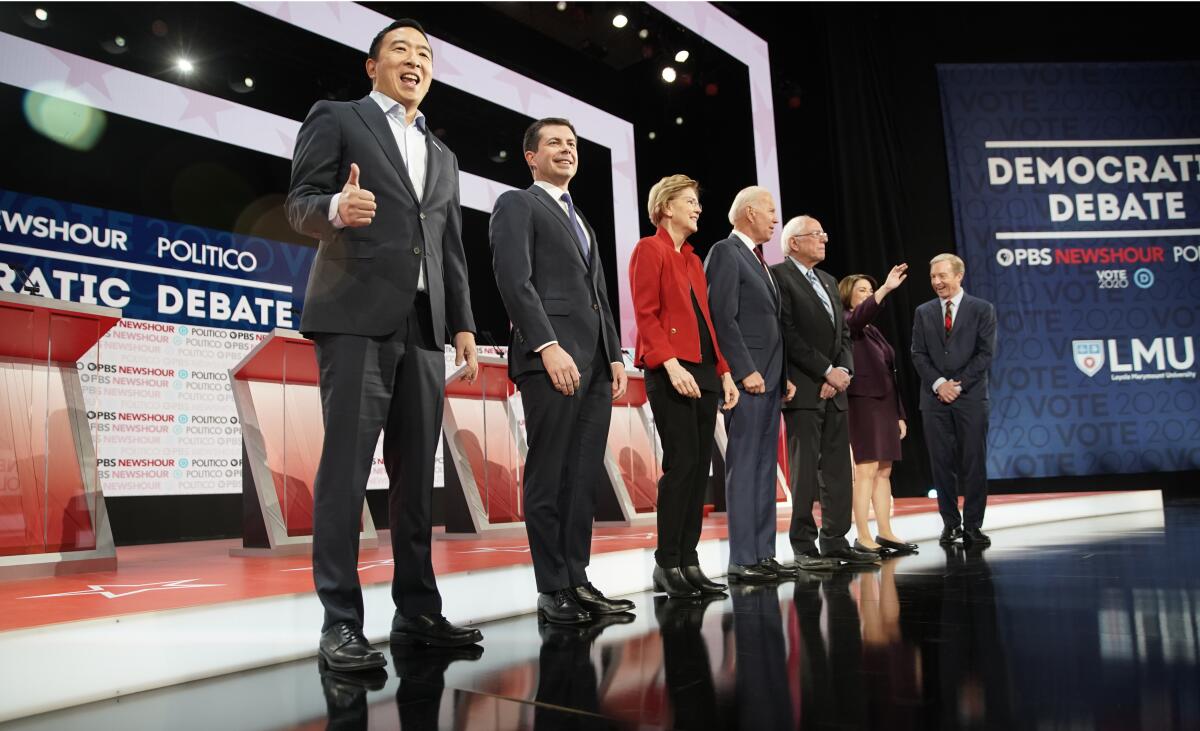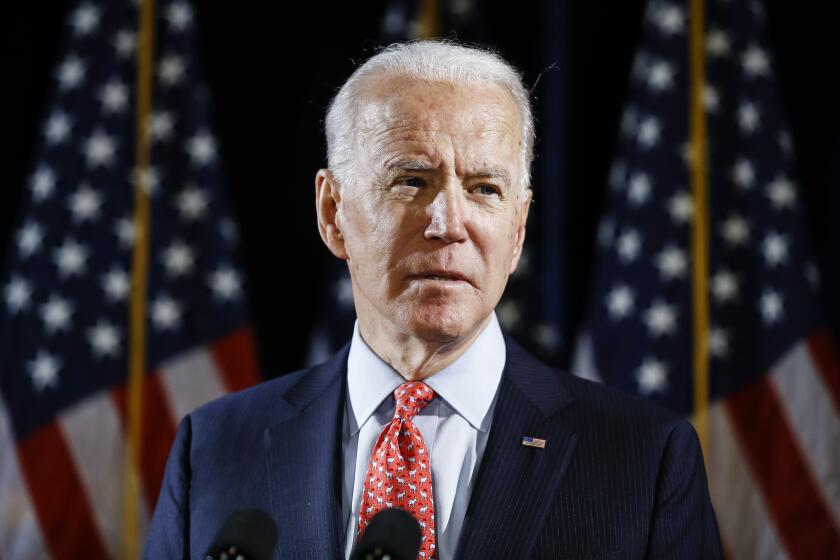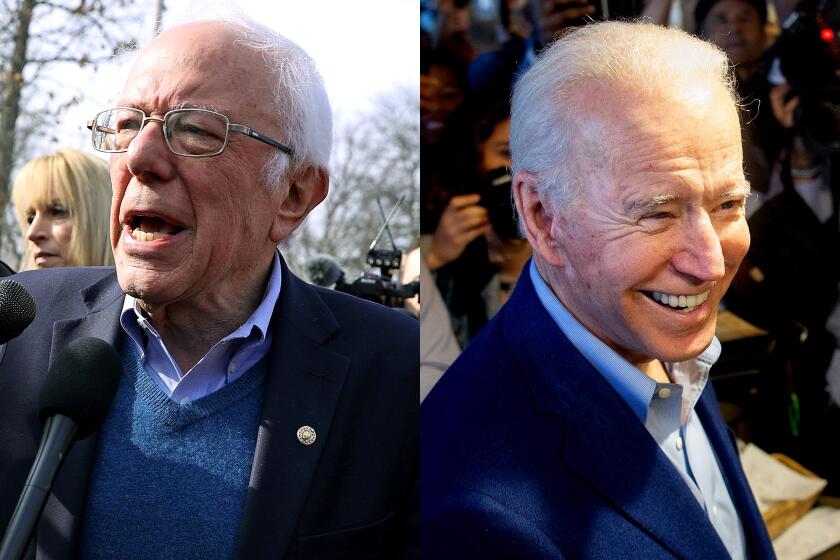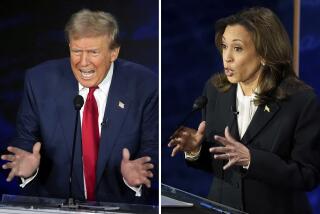What time is the first February Democratic debate?

- Share via
For the first time this election cycle, the Democratic candidates will take the debate stage after a (very small) fraction of voters have had their voices (mostly) heard.
Friday’s Democratic debate in New Hampshire comes just four days after the Iowa Democratic caucuses, where software and phone line issues led to an embarrassing delay in the release of Monday night’s results. Instead of riding a wave of momentum and campaign cash into the Granite State, candidates stumbled into New Hampshire not sure if they’d won, lost by a bit, or lost by a lot.
The Iowa fiasco raises the stakes for the Feb. 11 New Hampshire primary, the next opportunity for candidates to take a victory lap and for voters to help winnow the field.
For some candidates, this might be their last debate. If the results of the New Hampshire primary don’t force them to drop out, the new, stricter requirements for the Feb. 19 debate may sideline them.
What time does the debate start?
The debate will begin at 5 p.m. Pacific time and will last three hours. ABC News is hosting the event with Apple News and WMUR-TV Channel 9 from St. Anselm College in Manchester, N.H. ABC’s George Stephanopoulos, David Muir and Linsey Davis will moderate the debate with WMUR’s Adam Sexton and Monica Hernandez.
How do I watch the debate?
It will air on ABC News and livestream from its website. The debate will also be available through Apple News and the ABC News apps for Roku, Apple TV, Amazon Fire TV and other platforms.
Who’s in the debate?
Seven candidates will appear on stage. Six took part in the January debate in Iowa: Former Vice President Joe Biden; former South Bend, Ind., Mayor Pete Buttigieg; Minnesota Sen. Amy Klobuchar; Vermont Sen. Bernie Sanders; former hedge fund manager Tom Steyer; and Massachusetts Sen. Elizabeth Warren. Andrew Yang, a businessman from New York, is returning to the stage after missing the cut for the previous debate.

The field is down to Joe Biden now that Bernie Sanders ended his presidential campaign. Here is the Democrat heading for a battle with President Trump.
Who didn’t make the cut?
To get on stage this time around, candidates needed to poll 5% in four national or state polls, or 7% in two single-state polls. They also needed to receive donations from 225,000 unique donors, with at least 1,000 unique contributions from at least 20 states. Alternatively, candidates could get on stage if they earned one national delegate in Iowa.
That precluded former New York City Mayor Michael R. Bloomberg, who skipped the early states and has said he won’t accept any donations. Rep. Tulsi Gabbard of Hawaii, former Massachusetts Gov. Deval Patrick and Colorado Sen. Michael Bennet also failed to qualify.
Will they be in the next one?
Let’s just say the debate stage only gets roomier from here on out. Though the Democratic National Committee has dropped the donor requirement for the Feb. 19 debate in Las Vegas — a potential plus for Bloomberg if he gets his poll numbers up — it’s upped the polling requirements to either 10% in four national or state polls or 12% in two single-state polls. Winning a delegate in the Iowa or New Hampshire contests works too.
Are the Iowa caucuses going to come up?
As much as some candidates would like to forget it ever happened, it may.
The mess in Iowa also highlighted the rest of the issues with the caucuses: They’re inaccessible to some, they’re time-consuming, and Iowa is older and whiter than the Democratic base and the rest of the country. What better time to ask the candidates if the Iowa caucuses should be retired?
What’s different about this debate?
It’s the first debate after the start of the primary season and the last debate before New Hampshire voters head to the polls on Feb. 11.
The initial Iowa caucus results were muddled, but Monday appeared to have been a good night for Buttigieg and a bad night for Biden, who served under President Obama. The candidates may get a little more aggressive Friday, as Biden has been previewing on the campaign trail. During a stop in New Hampshire on Wednesday, Biden said nominating Sanders would force all Democrats to bear the “socialist” label in this election cycle and Buttigieg doesn’t have enough experience.
Buttigieg hit back in an MSNBC interview that aired Thursday, saying that “the bulk of credit for the achievements of the Obama administration belong with President Obama.”
Here are key dates and events on the the 2020 presidential election calendar, including dates of debates, caucuses, primaries and conventions.
Have the New Hampshire debates been usually aggressive?
Historically, the debate that occurs between the Iowa caucuses and the New Hampshire primary is a crucial time for floundering campaigns to take a run at top-tier candidates.
Three days before the 2008 New Hampshire primary, Hillary Clinton and Barack Obama traded barbs over their records — he said she represented the status quo and she said he’d flip-flopped on issues. That was also the debate in which Obama (in)famously said Clinton was “likable enough.” Days earlier Obama had won first place in the Iowa caucuses, and Clinton had, shockingly, come in third after John Edwards. (Clinton won New Hampshire.)
Eight years later, Florida Sen. Marco Rubio rode the momentum of his close third-place finish — behind Donald Trump and Texas Sen. Ted Cruz — to New Hampshire, only to be crushed by New Jersey Gov. Chris Christie in a Manchester debate. Christie compared Rubio’s limited experience as a first-term senator to Obama, and mocked him when he repeated a canned, prepared remark in rebuttal.
“The memorized 30-second speech where you talk about how great America is at the end of it doesn’t solve one problem for one person,” Christie said.
Christie didn’t benefit from the hit — he dropped out after coming in sixth in New Hampshire — but Rubio didn’t fare much better. He ended his campaign a month later after losing his home state of Florida.
So a good debate performance doesn’t translate to a win in the primary?
That won’t stop the candidates from trying though.
One last thing — what’s this I hear about more debates in February?
You heard right: There will be two more debates in the early states before the month ends. In addition to the Feb. 19 debate in Nevada, before its Feb. 22 caucuses, there is a Feb. 25 debate in Charleston, S.C., before its Feb. 29 primary.
More to Read
Get the L.A. Times Politics newsletter
Deeply reported insights into legislation, politics and policy from Sacramento, Washington and beyond. In your inbox twice per week.
You may occasionally receive promotional content from the Los Angeles Times.












